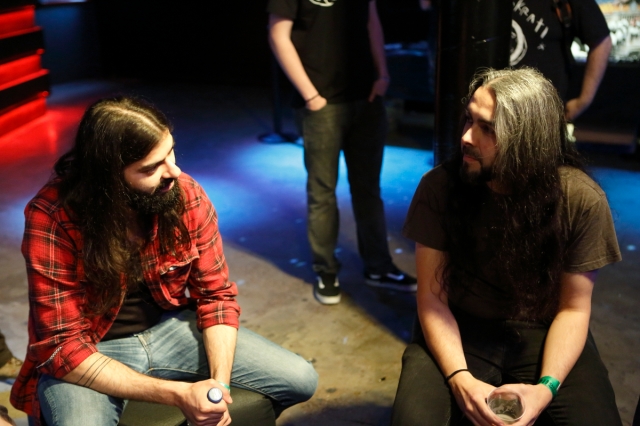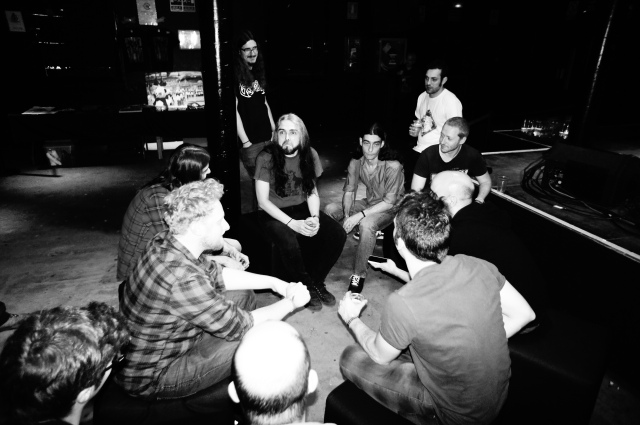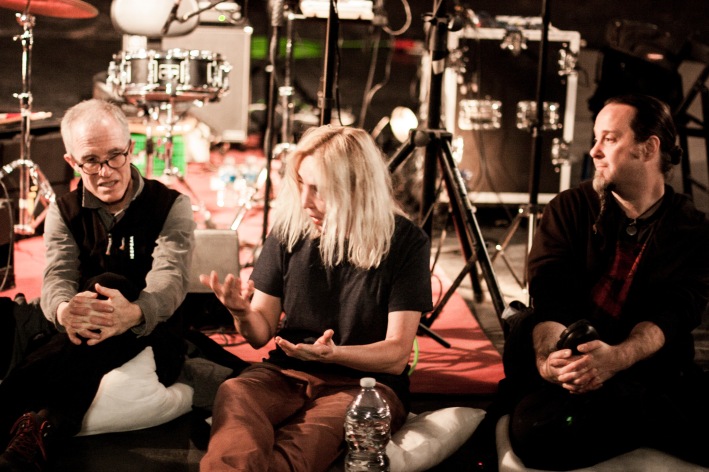[Spanish translation here]
Dear acolytes,
Here’s the complete transcription of the conversation we held with Matt Rozeik and AJ Cookson (Necro Deathmort), Mr. Ax, Christopher, Andy and Oisin (Dejadeath), David Sabaté (Mondo Sonoro) and ourselves during the latest Ritual Cvlt BCN Party #3.
David Sabaté (Mondo Sonoro): How did Necro Deathmort come up with such a mix between electronic music and Death Metal? Was it your intention to produce these results from the beginning?
Matt Rozeik (Necro Deathmort): Not really, we used to play in more conventional Doom Metal bands, with drummer and all that stuff. And then he didn’t turn up for practice one day… (laughs).
We have always made electronic music, so anything we do is always going to have a lot of electronic in it. We have never known any other way.
Edgar Merigó (Ritual Cvlt BCN): Do you get a lot of people looking at you over their shoulders and stating that you are not a “proper” Metal band?
AJ Cookson (Necro Deathmort): We haven’t actually had that much criticism for using computers, which you think we would, considering the sort of music we play. We played a festival in Leeds last week, which was full of Metal acts, for instance, and everyone accepted us. And it seems quite acceptable, so we just carry on, really.
It also started as something slightly convenient, in the fact that, if we had an idea, we could work making music anywhere that we could set up our laptop, be it in Matt’s living room or in a friend’s studio, anywhere. Normally a band would say “ok, now let’s get drums on this”, but we were already onto the next song.
It came a point where we had like fifteen songs that we weren’t even going to put out in an album, and that’s why we got a stupid name.
Matt: Yeah, we weren’t thinking in seeing it printed on a t-shirt in five years time… (laughs)
Edgar: Actually, Dejadeath have a rather stupid name, too!
Andy Kruger (Ex-Dejadeath): It means laziness, it’s a play with words. If you read it in Spanish it’s like sloppiness, laziness.
Matt: I thought it was a pun on déjà-vu… (laughs).
Mr. Ax (Dejadeath): There’s Spanish people that still don’t get the joke. They go “deeigideeith” or “daaigeedith” (more laughs).
Andy: Apparently and if I’m not mistaken, there’s a deejay who’s called DJ…
Everybody: …DJ DEATH!!! (laughter)
Mr. Ax: Do you know what “Mort” means?
Matt: Yeah, it means “Death”… So, technically, our name means “deathly death death”.
Edgar: It’s almost like Arnold Schwarzenegger! (laughter)
Mr. Ax: I was saying it because “Mort” in Catalan means “Death”, also!
Matt: Yeah, I think all Latin languages have that word.
Andy: You should have named yourselves “Thanathos Necro Deathmort”.
Matt: Just to flaunt Latin, yeah. (laughs)
David: It is obvious that sense of humor is important in both bands.
Matt: It is important in life, isn’t it? Even if you’re in a Metal band… Maybe once I knew any friends that had no sense of humour.
Edgar: I don’t see that much sense of humour reflected in NDM. First time I approached it, I didn’t perceive it as a funny band.
David: Well, there’s some song titles that are rather funny, take “This Beat is Necrotronic”, for instance…

Edgar: You’re right.
Christo, did you know that Matt knew about Asgaroth, weirdly?
Matt: Yeah!
Christopher Baque-Wildman (Dejadeath): Actually there’s a friend of mine from London who knows you guys, he’s a member of Indesinence, Ilia.
Matt: Yeah, isn’t he also in Grave Miasma?
Christopher: Not really, that’s the drummer Danny. He’s one of me best mates, Ilia. We’re going to see his new project, Binah, in June.
Matt: We will be around!
Christopher: Yeah, we will see you there.
David: Dejadeath, tonight you will be playing your first gig ever. Why now, and why today at Ritual Cvlt BCN?
Edgar: We tricked them into it.
Mr. Ax: Yeah, he told us that we had to play live, and he arranged everything that was necessary.
Edgar: I was wondering… Both NDM and Dejadeath are projects that came to life because you were bored. Or at the very least, because you didn’t have the responsibility or the pressure to “be in a band” and you didn’t have to face the expectations from anybody. But now both bands have started becoming successful, maybe because you have been free to do whatever you really wanted to do.
Christopher: Absolutely. I mean, I’m thirty-seven. I’m not sure about you guys, but…
Matt: Yeah, mid-thirties, as well.
Christopher: So, we’re just at the point where we just want to have fun. We just want to do music, you know. For us, our true bond is that we share the same sense of humor. Just laughing and not giving a fuck.
Edgar: It’s as if Death Metal were just the language you all happen to be familiar with, but your real common ground is humor.
Christopher: Probably! You know, we grew up with OSDM when we were kids, so it’s just an excuse to go back to having a bit of adventure, and doing some videos, and exploring some stuff and facing ourselves with what pisses us. Actually, the band started with us just writing random lyrics in a bar. Even the name’s a bloody joke, for fuck’s sake.
Edgar: Yeah, but now you’re presenting your second album… How does it feel to have the responsibility, and the audience expectations, back at your door?
Oisin Martinez (Dejadeath): Well, that’s the reason why we’ll never play again! (smiles)
Christopher: You guys are sort of intelligent enough. Enough to keep it down to the very minimum, and just enjoy it, travel, do stuff.
Matt: Yeah, we wouldn’t add anybody, it’s been too long doing our thing to add anybody doing anything that is not taking care of our merch.
Christopher: So you guys have known each other for very long?
Matt: Not that long, about ten years?
AJ: Yeah, ten years, I guess that’s a long way… Yeah, pretty much when we met, we started making music straight away. I remember when I met Matt, he had a huge stack of albums in his hands, and he said: “why don’t you listen to those, and then we’ll talk”. I already knew many of them, but others just opened a whole new world to me.
Edgar: Can you name some?
Matt: Well, basically, he hadn’t got into Justin Broderick or anything like that at the time, so I just told him “this guy is basically you”.
AJ: I was making Drum & Bass and electronic music and Industrial Metal and things like that, and Matt told me I was basically doing Godflesh. I wasn’t really aware of it at the moment, I knew of the band, but I just didn’t know there were so many different facets to it.
Edgar: Have you met the man, Justin?
AJ: Yeah, I chased him around Supersonic… (everybody laughs) I don’t drink a lot normally but if I don’t drive I normally drink. So I saw him at Supersonic and he was basically trying to find a quiet spot but I went up to him and fed him our CD, he told me that he would play it in his car… He’s a nice guy.
We’ve actually played a lot of festivals where we’ve been in the same bill, but we’ve never quite caught up with him. But one day we will! (laughs)
Edgar: You should do a remix!
Matt: We’d love to, yeah. We even thought about emailing him about that. We did email Mick Harris of Scorn, however.
Edgar: I’m so sad that Mick put Scorn to sleep. It was one of my favorite electronic acts ever.
Matt: Yeah, really underrated. He’s a metalhead making electronic music, and there’s not many of those that I can name that actually accomplish making great electronic music.
Edgar: He used to make one of the most exquisite and elegant kinds of electronic music.
Matt: I think that electronics are sort of ten years late for Metal, since there is still a lot of hatred for keyboards in Metal, and a lot of things about keeping it true and only sounding like you are from 1986, you know.
Edgar: Well, to me, Scorn playing Roadburn is a symptom that these barriers have been torn down somehow. You have just told us that you yourselves haven’t had that much criticism about bringing laptops and keyboards onstage!
Matt: That’s true… The only criticism we got was after releasing our first record, some media said that the funny song titles were just ruining the vibe, that they were spoiling the mood. I didn’t take it that seriously, I’m the fucking writer, you know… I listen to Melvins as well, and they’re like the ultimate band for doing stupid stuff, so… They have done everything, literally everything that you can possibly do as a band.
Christopher: Ultimately, you know, lyric-wise, it’s a sort of joke, isn’t it? As a musician, the words you write… It’s as if you had the obligation to sing something. It’s one of these aesthetic barriers that seem to just be there and floating around.
Matt: Half the bands I know wouldn’t even want to sing lyrics if they didn’t have to. That’s why they just…
Christopher: …just bark.
Matt: Yeah! That’s kind of annoying, when you have to think of something. That’s why I think a lot of bands would just write their lyrics in the studio. They have these song that they’ve perfected after playing it a million times, getting lyrics into it was just not the fun part.
Edgar: You actually chose to bury the lyrics into the mix, so nobody understands what you’re talking about. And I think that is actually honest, it’s like “we don’t have anything poetical to say through literature, so we just prefer to bark and use our voices as if they were synth lines”.
Matt: Yeah, it’s just another layer! I mean, I’m not David Lee Roth, am I? Wouldn’t really wanna be, either.

Edgar: Whereas Dejadeath are really serious about their lyrics, despite your sense of humor you want them to be meaningful, they have a message.
Mr. Ax: Meaningful for us, you mean… “Purple Dawn”, for example, is about Andy’s shirt. (laughter)
Andy: Well, I have to say that there is a difference between the lyrics of the first record and the lyrics of the second record. The first one was extremely stupid. We had lots of fun doing it. And I think the second… Well, it is stupid, but there is some thought about it. Whereas the previous one, well: we went to a bar and we wrote it down, while having a beer, and you know, if it rhymes, it rhymes, and if not…
Mr. Ax: We had a song where every line would end in “…ation”.
Andy: Yeah, that one was great (laughs).
Edgar: Where did you write the lyrics for the second album?
Andy: Well, I didn’t do much for the second album, and that is why it is so good (laughter).
Christopher: Well, we grew up in a sort of catholic environment and one thing about the Catholic Church is that it has great control of what we should do, and it’s just absolutely ridiculous. Of course, now in Spain, with the new government, it is growing again and we just loath listening to that. And like so many traditions in Spain, it’s just bloody ridiculous, rooted in the past. So we just had a lot of fun taking the piss out of it, actually bringing it forward, taking it out of context.
Not really important. (laughter)
Edgar: Have you listened to one another’s music?
Matt: I did, I listened to Dejadeath a week before coming here.
Edgar: …and you guys scared him to death, he wrote me like “are you sure we’re going to go with these guys? They’re just too heavy for us…”.
Matt: Yeah, haha. In the last years, it has been easier for us to play shows where there was a great variety of bands and styles: Grind, Doom, Drone, Noise… We used to play just the arty festivals.
Christopher: I think you sound really extreme.
Matt: Yeah, I think you want to find new extremes when into heavy music, there’s only so fast you can shred or play blast beats… You will always come across the borders. I think that’s why super-technical Death Metal was really popular ten years ago and now it seems to have fallen into slumber. It’s because the boundary has been defined. There’s only so fast you can play, and then, you know, what?
Everybody is still kind of doing Black Sabbath, in their own way. It’s not changed that much. It’s not like if you play it super fast you’re going to engender something new.
David: Talking about Black Sabbath, someone described you as “the missing link between Black Sabbath and Kode9”. Do you agree with that?
Matt: Not really, no (laughs). I think we have more to do with Kode9 than with Ozzy, really.
David: Your music aesthetics permits you to play as soon in Sónar Festival as in Roadburn, which audience do you like best?
AJ: You can never known, we have played shows that we thought were going to be shitty and then it turned round and they were great, you never know.
We were once supporting an Atari Teenage Riot show and, all throughout the show, there was these guy going thumbs down all the way through and Matt’s looking at me, going (grimaces and everyone laughs). So in the end, Matt tells me “come on, let’s just get the fuck out of here, let’s get the stuff in the car”. So we’re loading up the car and then, as we’d have it, the guy who was giving us the thumbs walked out really pissed out of the venue and walks towards us, and tells us “Guys, that was AWESOME” (everybody laughs). So I ask him “man, then I were you giving us the thumbs down?” and he answers “well, I thought it was the right thing to do, because giving you the thumbs up would have been just too cheerful”. (laughter endures)
And then again, there have been shows that we’d thought had gone real well and people had actually just ignored us. You can never tell.
Edgar: OK lads, thank you so much, I wish we could stay a little longer, but we have to carry on with the show.
Matt: Let’s play some music!
Everyone: Yeah!
///
Pictures by Eduard Tuset & Javi Tupatutupa
Join the Cvlt & Obey the Sacred Noise



















